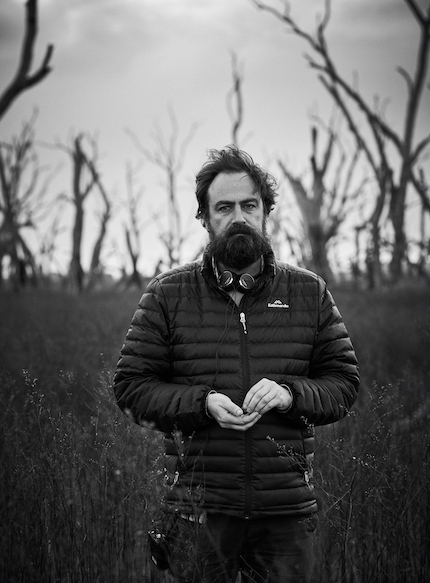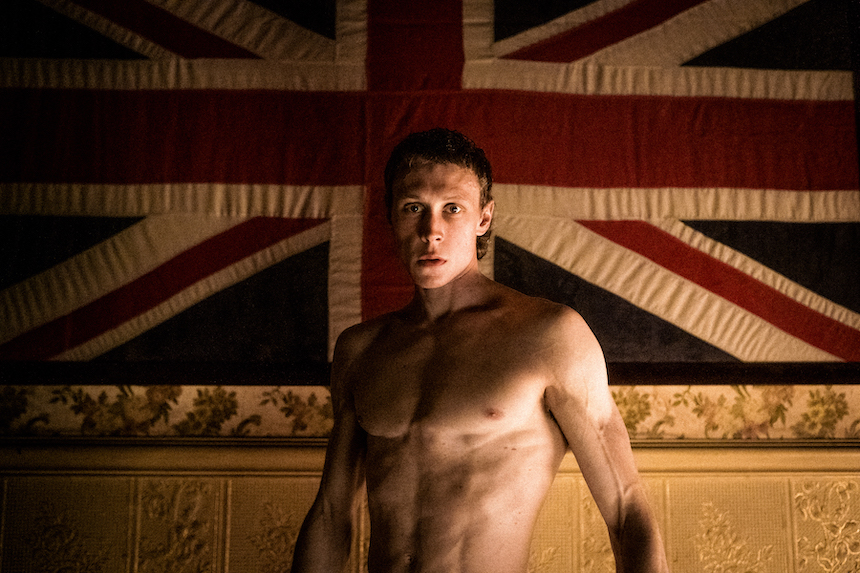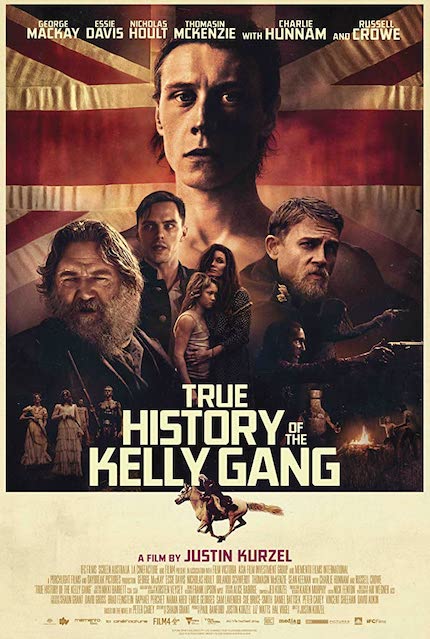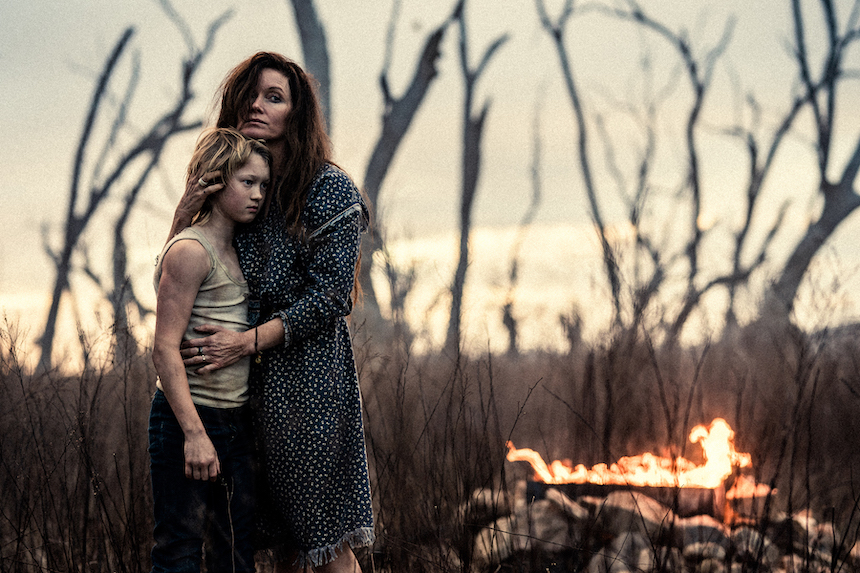TRUE HISTORY OF THE KELLY GANG Interview: Justin Kurzel on Returning to Australia, Exploring a Legendary Life

After directing a stunning version of William Shakespeare’s Macbeth and the entertaining but flawed adaptation of the Assassin’s Creed video game (both films starring Michael Fassbender and Marion Cotillard), Justin Kurzel decided to return to his home country.
The last time Kurzel shot a feature in Australia was back in the early 2010s: Snowtown became his debut film as a director in 2011 and proved to be controversial because it brutally depicted the real-life case of famous Australian serial killer John Bunting and his relationship with one of his stepsons, James Vlassakis.
Kurzel’s latest is True History of the Kelly Gang, which has some similarities with Snowtown. It’s also based on real people, works as a coming-of-age story and because of how it approaches its protagonist, it definitely won’t be for everybody.
True History of the Kelly Gang take us to the 1870s to explore the life of the legendary bushranger Ned Kelly (played here by George MacKay and Orlando Schwerdt). Inspired by Peter Carey’s novel of the same name, Kurzel’s film is divided in three parts (“boy”, “man” and “monitor”), each one showing a different period of Kelly’s journey to becoming a notorious outlaw.
Playing with the thin line between facts and myths, True History of the Kelly Gang firstly presents Ned Kelly as a young boy who suffered the death of his Irish father (Ben Corbett) and who had to “be a man” from early on. Essie Davis plays Ned’s mother Ellen and Russell Crowe briefly appears as bushranger Harry Power, both the main adult figures that pretty much lead Ned to what he originally didn’t want to become. Then, as a young man who has already served time in prison, Ned returns home to eventually embrace his destiny, but not before the main conflict between his family and the law is established. He ultimately takes on the role of a sort of antihero, the leader of a gang who faces the oppressors that took over Australia.
I spoke over the phone with the director Kurzel to discuss True History of the Kelly Gang, now that the film will be released by IFC Films on Digital and On Demand on Friday, April 24, 2020. It’s also worth noting that, in the midst of the coronavirus pandemic, the movie “will also be opening at a handful of drive-in theaters across the US on the same day.”
ScreenAnarchy: This is your first feature set in your country since SNOWTOWN. After a couple of international productions [MACBETH and ASSASSIN’S CREED], how did you get involved with this project and how was to film again in Australia?
Justin Kurzel: Yeah, well, I was missing Australia a lot. The project was around before I made Macbeth and Assassin’s Creed, I was talking to the producers about True History of the Kelly Gang. There was a time that I thought I might do it after Snowtown, it was going to be my second film.
But in Australia making a film about Ned Kelly was inchoate for a little bit, you know?, to think so many films made about him and for some reason films about him are really interrogated much more than others. So there were few reasons there, I was really kind of cautious about wanting to make it.
Then after I made Assassin’s Creed I was really missing home, kind of a little lost creatively and just started to gravitate back towards this book and the idea of mythology and creating stories out of historical characters, and why people need these myths and legends, and the desperate need of a man trying to sort of save his own history by writing to his unborn daughter before his death. There was something in that perspective of Ned Kelly that was very, very different from what I’ve seen before. And yeah, I just wanted to shoot Australian characters again, hear Australian voices and do something that was fundamentally very Australian.

If TRUE HISTORY OF THE KELLY GANG has something in common with other of your films in terms of themes, I find it similar to SNOWTOWN when it works as a very brutal coming-of-age story. Why are you interested in exploring young characters with a difficult and violent environment to grow up in?
Yeah, I mean, there was definitely a kind of corruption of innocence there that was sort of interesting to us, that was probably the heart of what Snowtown was about.
I was really intrigued as to whether Ned was someone that became this kind of killer through the people around him and the environment and what was done to him, or whether there was something innately in him that was always going to kind of lead to that faith and destiny in the film.
And then there was these really kind of influential figures that hold over his life, like Ellen and Harry Power. Again, there was just some similarities in terms of the kind of power and control that John (Daniel Henshall) had over Jamie (Lucas Pittaway) in Snowtown. So there were definitely these sort of strange, mentor figures, wanting things from Ned but also wanting to mould him, that felt like a similar dynamic with Snowtown… yeah, I guess subconsciously I was attracted to and interested again.
Now that you mention the mentors that Ned has during his life, obviously there’s Russell Crowe’s character, but I think the main relationship that you are is exploring is the one of Ned and his mother. How was the process to take this complex relationship to the screen?
That was the fundamental relationship in the book that felt really new and fresh, never being told before, Ellen kind of hold over Ned, that was really powerful. Whether she needed him more than Ned needed her, whether at times where his ambition could have lead him to another kind of journey and another life that she kind of corrupted or destroyed. I was always really curious about the idea of what happens when a child outgrows the mother and the kind of grief of a mother and the selflessness of letting a son go, whether Ellen had trouble with that in Peter’s book. It’s a really interesting relationship and one that, definitely at the beginning of wanting to do the film, was one of the predominant parts of the screenplay that we definitely wanted to get close into.
Ned basically finds his true self once he discovers who the Sons of Sieve are [cross-dressing rebels from Ireland] and who his father really was. How was for you to approach this historical figure of Australia in an unconventional way?
Yeah, I think we just wanted to really play with it, stretch and test it. The whole thing was about mythology and there was a lot of fun to be had with that, the idea of a kid that was moving towards the famous faith and destiny, that he was going to become the Ned Kelly for Australians and what that was. Just revisiting that throughout the film and then there comes a point where perhaps you can’t outrun your faith and destiny and you have to become it and somehow by becoming it, it kind of liberates you, you almost become your true self in a way because you have to embrace something that’s not your wish. There was an energy to that, a kind of journey to that, that I think I was really interested in.

That helped define why we cast George MacKay, George is a very kind of beautiful, polite, innocent, sophisticated man, incredibly nice, and the idea of taking someone like that, that you can see has ambition, that you can see has a future that can go in many ways, but it’s kind of driven towards what it becomes at the end. That felt really good.
The film is also playing a lot with how history is written, what is real and what is a myth.
The main point you are doing, I think, is how important is for people to tell their own stories especially in a context of colonialism. How significant was for you to tackle this subject?
I think that was kind of the point of the book a little bit for us, how the True History of the Kelly Gang is sort of stating that this is the defining true history of the Kelly Gang, when we sort of play around with the title where it says “nothing you’re about to see is true… True History of the Kelly Gang.” There was always a really beautiful, playful thing about mythology and how we desperately kind of need it, to sort of define who we are, to understand who we are.
Ned Kelly was 24, you know?, he was a bushranger, robbed some banks, to some revolution, to others was just a cop killer. Yes, he’s being kind of idolized, mythologized, he’s become a kind of legend, being identified as a strong, masculine, kind of handsome male in Australia, someone to be and look up to as a man. We definitely found that really interesting, why is he become a carnival to us? Why are we searching for answers in a 24-year-old bushranger? Then, on the other side, you see the 24-year-old bushranger who is just an ordinary man, desperately trying to write his own truth, and kind of in the end becoming the mythology, he can’t outrun it.
That idea of truth navigating in the way of a good story, was something that we felt not only spoke to Ned Kelly but it also spoke to the country that we have been born in and grown up in, and it’s still going through a really challenging process of understanding who it is, who we are as a nation. That definitely made it more than just a biopic. It was about some sort of greater ideas that Peter invented and created for the book.
Like pretty much all your previous movies, this one is also visually striking. I loved, for example, that whole western-like and very violent sequence with Crowe’s character and young Ned Kelly. Also that last sequence from Ned’s POV, with the police in the dark. How was the process to create this kind of striking visuals?
I definitely wanted the aperture of the film to sort of close down and to become very, very specific in a point of view, you know?, that the whole world came down to Ned’s outlook through that helmet.
I get the film at the beginning feels a little bit more open and a little more familiar as a western. There are tropes there that make you feel like you're kind of watching a western, and then I think as it goes into adulthood, the film kind of closes in and becomes much more fervid and impressionistic and much more internal. There was a kind of an arc there stylistically that we wanted to play in.
I was in a pretty adventurous mindset when I was making it, you know? [laughs]. There was a spirit about the book and about doing it that felt really alive and felt like you wanted to play a little bit more in the way you made a film, it was sort of a little rule-less in the way we made it, in the way the film come out. That definitely informed the tone of the film and the way in which we went about make it.

This is the second film I’ve seen recently about Australia in the 1800s, being the other one Jennifer Kent’s THE NIGHTINGALE. In TRUE HISTORY OF THE KELLY GANG we see Irish prisoners, the British empire and so forth. How important was for you to deal with the past of your country?
The 1870s in Australia were pretty kind of badlands, it was pretty lawless, and there was a very thin line between authority and crooks. I always look at those times as pretty kind of blurred, there was some pretty crazy brutality that was going on.
You have to look at Jen’s film [The Nightingale] to sort of understand the brutality that happened to the indigenous in Australia. Jen’s film is so beautifully immersive in that period, it invites you and takes you into those times in an incredibly authentic, real and grounded way.
Our film, in terms of the period, it wasn’t as interesting to me as the questions and ideas that were in the book, and I guess the sort of baggage that came with the legend of Ned Kelly. It was definitely a kind of much more playful, acrobatic film about Ned Kelly as opposed to an immersive period piece. We were a little loosen but that’s because of how the film was a comment on mythology and a comment on a character that everyone in Australia has formed an opinion about.







